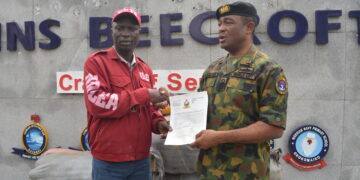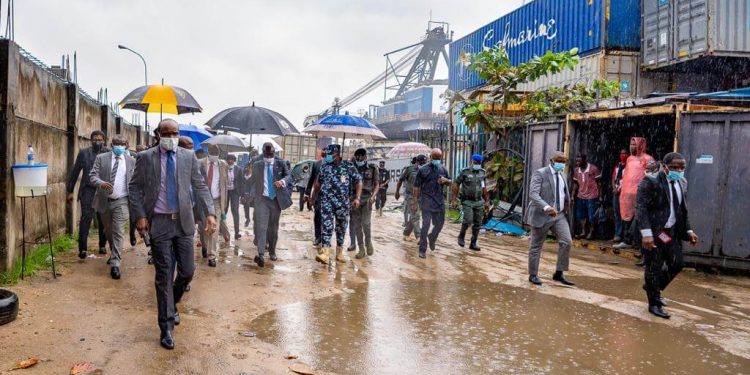By Dele Alabi
As a concerned Nigerian citizen who has lived in Apapa area of Lagos State for the past 24 years, and a former employee of the Nigerian Ports Authority, former member of Nigerian Ports Consultative Council and a transport and port logistics advisor, I passionately seek an urgent review of the recent ministerial order pertaining to loading and discharge of barges from the Outer Marina Mooring Point.
No doubt Government’s role and responsibility in ensuring good public order and sound house-keeping practices are inalienable, however, public decisions are best taken after careful and unbiased consultations have been carried out.
Unfortunately, the grounds of the current order by the Honorable Minister of Transportation, Right Honorable Rotimi Amaechi, apparently, acting in concert with the Executive Governor of Lagos, Mr. Babajide Sanwo Olu, do not appear to have been sufficiently and clearly articulated and explained to the public beyond non-compliance with some environmental rules and policies.
To the same extent, adequate consultations appear not to have been carried out.
Based on personal experience over time, If the hellish commuting constraint, which citizens who reside and work around Apapa experience, the decision to prohibit barge operation anywhere within Lagos metropolis, including Marina, which could have the direct effect of relieving traffic pressure on the roads at this time is simply not only counter-productive, but also hypocritical.
It is counter- productive, and as such, a decision can only further ultimately diminish Port and berth productivities, and further complicate driving and commuting experiences within the Apapa port and industrial entrepreneurial zones. Moreover, it is hypocritical, because the perennial traffic situation which is the semblance of a bedlam experience generally all over Lagos, and bearing a stinging fang at Apapa, has made motoring experience look like an intractable situation that requires only rocket science to deal with.
I dare say that it is largely owing to inappropriate tools, otherwise, why there is only one access to both ports in Lagos and this situation has lingered on long enough. Why can’t Government declare an emergency like it did with Nnamdi Azikwe International Airport at the Lagos seaports and all the associated installations, similar to what was done in Abuja and deal expeditiously with the access road infrastructural deficit.
In order words, why couldn’t Government consider shutting down all the berths or at least some berths of one of the ports in Lagos; rapidly divert the traffic and expeditiously address the road access issue once and for all? Are we suggesting that this issue has not assumed the status of a matter of national and urgent strategic importance?
God forbid, should there be an explosion or fire incident as experienced in Beirut a few weeks ago, or bridge collapse as happened in Italy in 2019, consequently, road congestion arising seemingly from poor land use pattern and traffic management with both factors causing suboptimal traffic flow, together with an envelope of tank farms in the area, all combine to make accessibility a major challenge in the area.
It is no secret that some trucks park on the overhead bridges for weeks awaiting their call up into the port, to an extent that truck drivers take their bath right on the highways, cook and use the highways as their rest room.
Going out and returning home to Apapa daily for residents and vice versa by persons whose offices are located at Apapa has routinely become an unpleasant experience that nobody would ever wish to experience. It becomes a life-threatening experience anytime truck drivers choose to act out of order and consequently restrict access from other motorists with smaller vehicles.
At such times, the vibration of the bridges with the dead load of static trucks on them could give an unlucky commuter goose pimples at such unlucky moments when one could unwittingly get trapped. There have been several unpleasant reports and incidents of trucks crashing on innocent motorists and commuters. It is an irony that government does not appear to show an appropriate measure of commitment to regulate that important sector. Certainly, drivers and mates act in a manner that they intimidate other road users.
Nigerian roads have earned the ignoble reputation as some of the most unsafe and dangerous all over the world. Of course, the vehicles that carry the port- generated freight are also not adequately regulated the way they should. Sadly, Government itself appears to be the worst culprit as its officials appear not to have been trained and orientated to equip them to deal with this aspect of our national life. In effect, many of them simply turn a blind eye even to minimal traffic management ethics and rules remedial.
Besides, the appropriate level of intervention through minimal road repairs of pot holes and gullies, installation of road furniture, signs and signages have not been adequately activated poorly attended to.
It is a national embarrassment that the port access has virtually been turned into a locale and theatre where sharp practices and brisk underhand deals by all levels of security operatives are consummated. What a shame! Gory tales are daily told of unfit trucks which ply the roads that are not road worthy, as they keep crashing on innocent motorists and commuters alike on a daily basis, either owing to failed brakes, poor structural integrity or some other operational issues.
The recent incident that involved Citizen Chidinma Ajoko and her colleague at work, who were reportedly crushed to death in their prime by a crashing container carrying truck, while returning from work in Lagos, clearly expresses the gory tale of seeming insensitivity in the management of that critical sector of our challenging national economy. Of course, there may have been scores of similar fatalities in several other locations around the country.
Driving around Lagos in general, and Apapa in particular could be likened to the valley of the shadow of death experience. It is common knowledge that trucks queue up for days and weeks and reports are even replete of drivers and mates who brazenly take their bath right on the port access road, cook their meals on stoves and sometimes use the open road as rest rooms. How then can we talk about our commitment to the Sustainable Development Goals and Agenda 2030 with this type of a situation?
Licensing of barges appears a smart strategy deployed by Nigerian Ports Authority to enhance optimal multimodality. It happens all over the world anyway. It is being adopted as a rule of thumb for transshipment and transit cargo optimization in several other ports around the globe. Elsewhere the practice is almost taken for granted, even in those other climes where several other modal options avail themselves for cargo evacuation.
A number of ports in southern China, especially in Shenzhen and Guangzhou, have established a twinning relationship, leading to an exciting barging operation involving containers meant for export with designated berths in Hong Kong Port with huge mutual operational benefits to all the constituent port entities.
By comparison, these are ports that are globally competitive and handle container units in several millions of TEUS each year, sometimes up to thirty million TEUs per annum.
In Nigeria, it will significantly enhance intra-port circulation and generally improve economy of scale within the port district .Correspondingly with improved efficiency of land use, which is a germane doctrine in the enhancement of port productivity, and by extension, the national economy, the nation and her citizens will be the ultimate beneficiaries.
It will also make international trade to be conducted more competitively as cost of cargo movement will naturally crash. This strategy will support the Economic Recovery and Growth Agenda of the Federal Government. It is in the place of Government to apply measures to improve barge operation and across the logistics and freight transportation value chains.
Mr. Dele Alabi, a former staff of the Nigerian Ports Authority and former member of the Nigerian Ports Consultative Council, wrote from Lagos.

































































